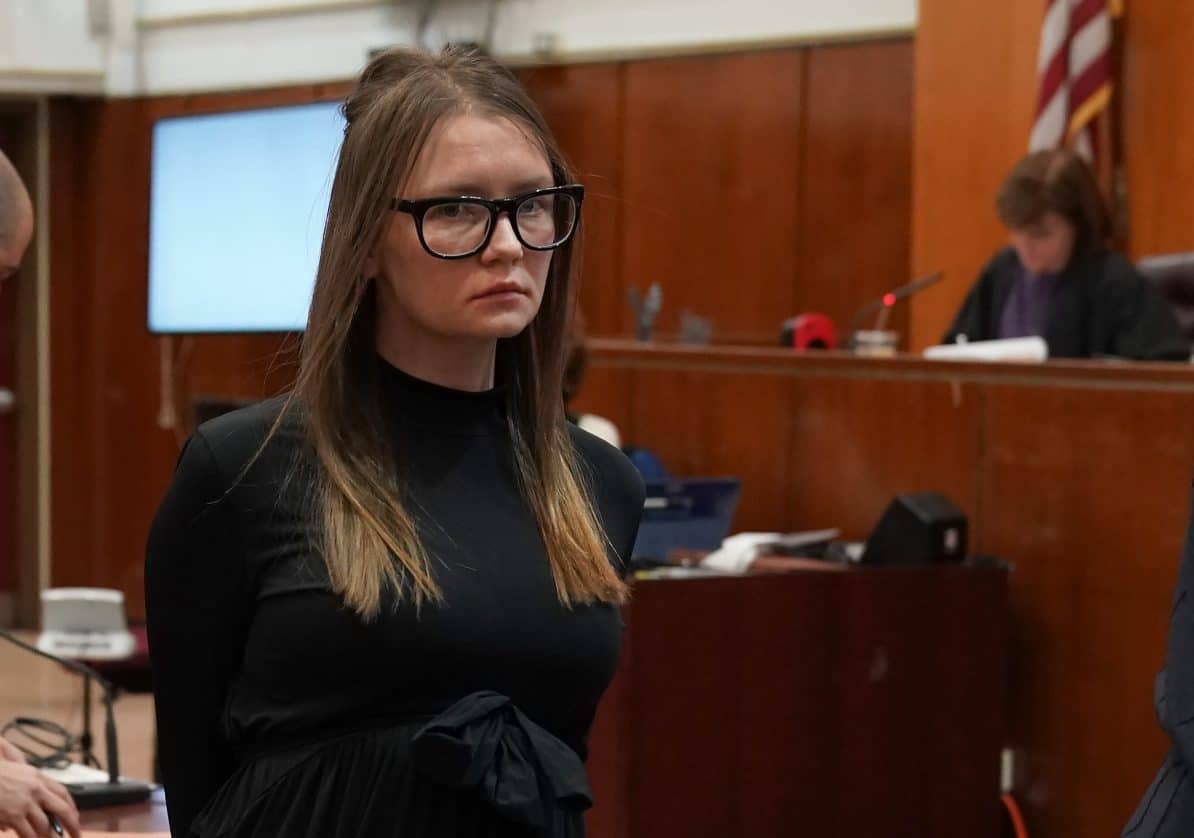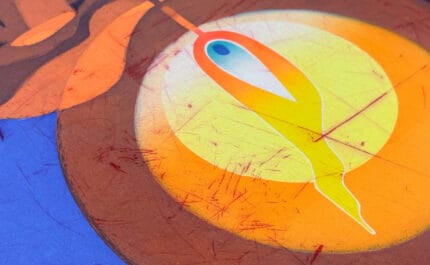Moment that mattered: ‘Fake heiress’ Anna Sorokin is sentenced
In 2019 we spoke to Rachel DeLoache Williams, author of the book My Friend Anna, about the sentencing of her former friend

Anna Sorokin is led away after being sentenced in Manhattan supreme court, 9th May 2019. Photo: Timothy A Clary/AFP via Getty Images
9th May 2019 (Taken from: #35)
On 9th May, a Russian woman who scammed her way through New York society by claiming she was a multimillionaire German heiress was sentenced to up to 12 years in prison. Anna Sorokin’s lawyer, Todd Spodek, had claimed that his 28-year-old client was merely trying to live by the aphorism “fake it till you make it” and planned to pay everybody back eventually, but the judge, Diane Kiesel, disagreed, saying she was “stunned by the depth of the defendant’s deception”. It was a dramatic end to a trial that had gained international coverage as a millennial morality tale for the social media age.
One reason the story caught fire was a viral April 2018 article in Vanity Fair written by Rachel DeLoache Williams, who worked at the magazine at the time she unwittingly became one of Sorokin’s victims. Williams’ compelling tale of how Sorokin “walked into my life in Gucci sandals and Céline glasses” divided opinion – its enigmatic protagonist was either a female antihero in the mould of Robin Hood, who struck a blow against New York’s monied elites, or a symbol of a shallow, materialistic and self-obsessed generation who won’t let anything get in the way of the perfect Instagram shot.
“In 2017 we struck up a fast friendship,” says Williams, who has now published a book, My Friend Anna, about the experience. “It’s funny in hindsight because Sorokin has been miscast as this person who was always out on the town, going to all the best restaurants and parties, but I’m pretty sure that during this time I was her only friend.” Born to a middle-class family in Russia in 1991, Sorokin introduced herself to New Yorkers as Anna Delvey, the daughter of a German billionaire who planned to open a members-only arts foundation in a historic Manhattan building. “She was working pretty hard towards the opening of the foundation,” says Williams. “She was strategising over what to do with the space and how to find investors. That part was sincere.”
But little else about Sorokin’s life in New York was as it seemed. When she returned to the city in 2017 after a spell in Germany, where she had moved with her family as a teenager, she checked into hip Soho boutique hotel 11 Howard and stayed in a $400-a-night room on and off for several months, tipping hotel staff with $100 notes and running up huge bills in its in-house restaurant, Le Coucou, which she charged to her room.
Sorokin has been miscast as this person who was always out on the town, going to all the best restaurants and parties, but I’m pretty sure that during this time I was her only friend”
She hired a personal trainer, flew in private jets and always wore designer clothes, even during her trial – she once even delayed court proceedings because she was awaiting an outfit. Before they met through mutual friends, Williams knew Sorokin from her Instagram account, a carefully curated attempt to present herself as a jetsetting socialite and a patron of the arts. Sorokin paid for everything when they met up, although they rarely strayed far beyond Le Coucou. “I tried to offer to pay my share,” recalls Williams, “but she was very convincing and said ‘you work harder for your money than I ever have’. I took her kindness at her word.”
Williams rejects the suggestion that she was seduced by the materialism and decadence a friendship with a wealthy heiress appeared to offer. “I really liked Anna as a friend and enjoyed spending time with her,” she says. “And I worked at Vanity Fair so hers wasn’t a new, magical world I hadn’t seen before. In many ways, I think she was more interested in my life and connections than I was in hers.”
Sorokin told friends that she already had $25 million but needed double that to open the Anna Delvey Foundation on Park Avenue South. In her efforts to obtain millions of dollars in loans she deployed bad cheques and forged documents, and invented fictional accountants and financial advisors. She racked up a $30,000 bill at 11 Howard, which she eventually paid using a $100,000 loan she succeeded in getting from City National Bank, which was never repaid.
Towards the end of their brief friendship, Sorokin suggested to Williams that they go on holiday together. Sorokin chose La Mamounia, a palatial five-star hotel in Marrakesh, and told Williams that she’d cover all costs for the group, which included her personal trainer and a photographer. As the unpaid bills mounted up, the holiday became a disaster.
“There was escalating pressure from the hotel management on Anna and they were insisting that she had to call her bank,” says Williams, who’d already put the flights on her credit card, in the belief that Sorokin would swiftly reimburse her. “They were supposed to have a functioning card on file when we checked in and of course I didn’t realise Anna didn’t have one until the trip was nearly over. On my last full day in Morocco these two managers appeared and refused to leave without getting a functioning credit card from us. Anna looked at me and asked if we could use mine for the time being; I was leaving before her so assumed the hold on my card would only be temporary. When I arrived in France for a work trip afterwards I got a text from Anna saying the full bill was going on my credit card and she’d wire me the money the following week.”
It was this mad quest to find truth and logic that finally led me to this moment where I realised it was all one long con”
Williams says she had $410 in her account on the day her credit card was billed over $62,000 for the Marrakech hotel. Over the next two months, Sorokin offered her victim an array of unlikely excuses. “It was Kafkaesque,” remembers Williams. “She would blame her bankers a lot, and she would also blame her parents [for stopping access to her trust fund]. For a long time, although I was destabilised financially and emotionally, I was concerned for her because it looked like she was having some kind of breakdown. It was… this mad quest to find truth and logic that finally led me to this moment where I realised it was all one long con.”
Williams went to the Manhattan district attorney and the police, and assisted in a sting operation. In July 2017, two months after the Morocco trip, Sorokin was arrested for skipping bills at several expensive New York hotels and restaurants. She was arrested a second time that October, accused of grand larceny and theft of services totalling around $275,000, charges which she denied. She was sent to the women’s prison on Rikers Island and for a period was held in a maximum security section due to her repeated bad behaviour.
In June 2018, two months after Williams’ story was published, TV producer Shonda Rhimes acquired the rights to Sorokin’s life story for a Netflix series; the New York authorities are trying to block a $70,000 payment and future royalties to the Russian, citing laws that prevent felons from profiting from their crimes. The $30,000 she received upfront from Netflix paid for her legal team. “It’s pretty dark,” says Williams, “that someone can commit crimes and get a TV deal. The money should go to her victims.”
Although Sorokin was found guilty on 27th April 2019 of various fraudulent activities, she was acquitted of stealing the money for the Morocco trip from Williams (much of which was eventually covered by American Express), who earlier in the trial had broken down in court during cross-examination, describing the incident as “the most traumatic thing” she had ever been through. Sorokin’s lawyers suggested that Williams, whose TV and book deals relating to the case are reportedly worth more than $600,000, was exploiting her relationship with Sorokin for financial gain. “That’s backwards on so many levels,” Williams says. “This is someone I was friends with for a little over two months and then I went through two years of hell trying to get my life to not fall apart and dissolve. When I filed for bankruptcy and moved home it took so much strength and stamina. I worked so hard to find my way to where I am today.”
Williams believes Sorokin is a sociopath who would never have stopped manipulating those around her if she hadn’t been caught. But should her misadventures be viewed as a morality tale about wealth and status in a social media era? “Yes and no,” says Williams. “There’s something to that in a Great Gatsby kind of way, with her being a hollow, narcissistic person who has a sick drive to be taken seriously in the world of money and art and the New York cultural scene. But in regards to what I experienced this is more to do with the value of friendship and betrayal.”
Slow Journalism in your inbox, plus infographics, offers and more: sign up for the free DG newsletter. Sign me up
Thanks for signing up.








